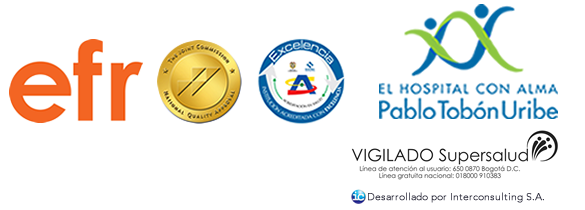Nuclear Medicine

The Pablo Tobon Uribe Hospital has a high-quality Nuclear Medicine service equipped with state-of-the-art gamma cameras, a Pet-CT scanner, and Radio 223 treatments. It also boasts an excellent team of medical specialists and healthcare professionals trained in nuclear medicine.
Request your appointment through our Online Services or in contacts:
![]() (604) 445 9079
(604) 445 9079
![]() This email address is being protected from spambots. You need JavaScript enabled to view it.
This email address is being protected from spambots. You need JavaScript enabled to view it.
What is nuclear medicine?
Nuclear medicine is the field responsible for the functional, cellular, and molecular evaluation and treatment of the human body's different organs. It utilizes radioactive substances that bind specifically to certain cells for this purpose.
Service Portfolio
- Scintigraphy: a diagnostic method that uses gamma radiation and certain radioactive substances called radiopharmaceuticals, which can serve therapeutic, diagnostic, and/or research purposes in various diseases (oncological, neurological, pediatric, gastrointestinal, genitourinary, cardiac, endocrinological, infectious, among others). The gamma camera is the equipment responsible for capturing the images emitted by the radioactive material to assess the functioning of different organs and systems and detect diseases affecting them.
- PET-CT: It is an imaging diagnostic method that sequentially obtains PET (Positron Emission Tomography) and CT (Computed Tomography) images using a single PET-CT tomographic device. To obtain the metabolic or functional image (PET), intravenous administration of a radiopharmaceutical is required. Additionally, the patient must rest for an hour before entering the tomograph for radiation detection and morphological image acquisition. We use two radiopharmaceuticals, 18F-FDG, which is an analog of natural glucose found in fruits and cereals, and Fluorocholine, which is used to determine cellular proliferation. To date, no allergic reactions or adverse effects have been described for these radiopharmaceuticals.
- RADIO-DICHLORIDE 223 Radium-223 dichloride is a radiopharmaceutical that acts as a therapeutic agent emitting alpha particles. It is introduced into the bone and is absorbed by the areas where cancer is present in the bones. Once in the bone, it causes the death of some nearby bone cancer cells, reducing pain, and improving the quality of life for patients.
The treatment is given intravenously and lasts for approximately one minute. It consists of six doses, one dose every four weeks, for a total duration of approximately six months. The administered dose is determined by the nuclear medicine physician.
How are the studies performed?
Radioactive materials, called radiopharmaceuticals, are administered in small amounts via intravenous, inhalation, or oral routes. These materials distribute and accumulate in the specific area of the body to be examined or treated.
What are the risks of nuclear medicine?
The risks are very low because the radiation you receive is minimal and tailored to your specific characteristics such as age, weight, and pathology, among others and it does not increase with the number of images taken during each test. The substances we use are non-toxic, rarely cause allergic reactions, and are painless. Diagnostic nuclear medicine procedures have been used for over seven decades, and there are no known long-term adverse effects from such low-dose exposure. You will always receive information about possible side effects before therapy, and all your doubts will be addressed.
Contact us
![]() + 57 4 459425 International patient office.
+ 57 4 459425 International patient office.![]() + 57 3174013663 International patient office.
+ 57 3174013663 International patient office.
Email: This email address is being protected from spambots. You need JavaScript enabled to view it.




